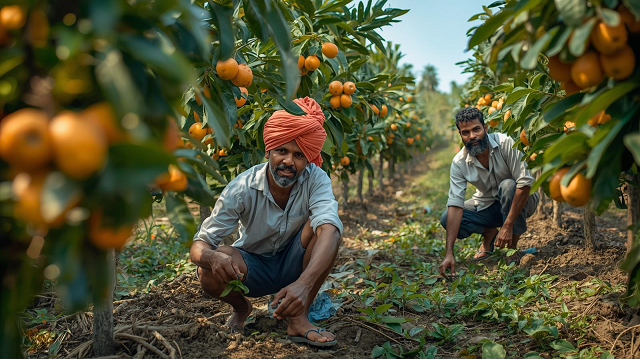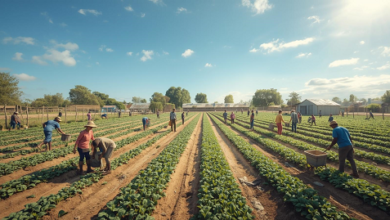Fruit Picking Jobs in Sweden for Africans 2026

Fruit Picking Jobs in Sweden for Africans 2026
Introduction
Fruit picking jobs in Sweden have become one of the most sought-after seasonal employment opportunities for Africans in 2026, largely because these positions offer reliable income, stable working conditions, and the potential to earn in foreign currency. Sweden has continued to rely on seasonal migrants to support its agricultural workforce, especially during peak harvest seasons when local labor supply is insufficient. For Africans seeking legitimate work abroad, Sweden presents a favorable environment due to its structured labor system, strong worker protections, and transparent recruitment procedures. As global migration and remote employment evolve, more Africans are exploring opportunities in Europe’s agricultural sector, and Sweden remains one of the most organized and welcoming destinations for seasonal farm workers.
This long-form guide provides a deeply researched, comprehensive, well-structured, and analysis of fruit picking jobs in Sweden for Africans, particularly for the 2026 employment year. Readers will gain insights into job availability, background information, recruitment history, eligibility requirements, visa pathways, expected salaries, working conditions, application processes, selection procedures, common challenges, testimonies, and useful expert guidance.
Overview of Fruit Picking Work in Sweden
Fruit picking jobs in Sweden fall under the broader category of seasonal agricultural work, covering harvesting tasks for apples, berries, cherries, pears, plums, strawberries, and greenhouse produce. Sweden’s farming sector is highly mechanized, but many crops still require manual harvesting due to delicate conditions that machinery cannot handle. As a result, farms consistently recruit foreign workers for temporary contracts.
Fruit picking is labor-intensive but does not require advanced qualifications, making it suitable for Africans with or without prior experience. Typical responsibilities include collecting ripe fruits, sorting, cleaning produce, packaging, loading crates, maintaining hygiene standards, and supporting general farm operations. These jobs are heavily regulated to prevent exploitation, ensure fair pay, and provide safe working environments.
The demand for workers continues to rise due to Sweden’s expanding fruit industry, aging domestic workforce, and increasing export needs. For Africans seeking seasonal jobs that offer a clear path, straightforward tasks, and structured compensation, Sweden’s fruit farms remain highly attractive. As European labor shortages intensify, Sweden’s reliance on international workers is expected to grow further in 2026.
Importance and Relevance in 2026
The year 2026 is significant for Africans seeking fruit picking jobs in Sweden due to evolving labor trends, agricultural expansion, and demographic changes in the country. Several factors contribute to increased relevance:
Rising Labor Shortages
Sweden faces ongoing worker shortages in rural and agricultural areas because younger citizens prefer urban employment. With fewer locals available, farms increasingly turn to international labor markets, including Africa.
Fruit Picking Jobs in Sweden for Africans 2026
Expansion of Berry and Apple Production
Sweden’s berry industry, particularly strawberries, blueberries, and lingonberries, continues to grow annually, creating more seasonal vacancies. Apple orchards have also expanded due to improved climate conditions and higher domestic demand.
Sweden’s Transparent Migration System
Sweden maintains a highly organized work permit and visa framework that protects both employers and employees. For Africans, this ensures legitimacy and clear legal pathways.
Higher Earnings Compared to Domestic Jobs in Africa
The potential to earn in foreign currency, especially Swedish Krona (SEK), attracts workers from various African countries seeking improved financial stability.
Bilateral Employment Pathways
Several African countries have improved labor agreements with European nations. Although not universal, new frameworks in 2025 and 2026 support safer migration and reduce exploitation risks.
Growth in Ethical Recruitment Requirements
Sweden enforces strict rules requiring farms to provide fair wages, accommodation options, and safe working conditions, making it one of the best European destinations for African workers.
Overall, 2026 presents an ideal year for Africans interested in fruit picking jobs due to demand growth, worker protection laws, organized hiring systems, and promising financial rewards.
Main Background of Seasonal Farm Work in Sweden
Seasonal farm work in Sweden has historically relied on foreign workers from various regions. Initially, many workers came from Eastern Europe, Russia, and the Baltic states. But shifting labor patterns and wage competition have opened more opportunities for Africans.
Fruit picking emerged as a major labor category in the early 2000s when Sweden expanded commercial berry farming. By 2010, farms began recruiting workers from Asia and Africa due to shortages among traditional labor sources. Since then, seasonal migration has become an integral part of Sweden’s rural labor force.
Key Characteristics of Swedish Seasonal Work
Seasonal farm jobs in Sweden are structured around defined periods, typically between May and October. Contracts specify working hours, accommodation arrangements, conditions of employment, and pay rates. Workers are often recruited directly by farms or through licensed labor agencies. The Swedish Migration Agency oversees visas and permits to ensure compliance with local laws.
Why Sweden Is Popular Among African Workers
Sweden stands out due to its worker-friendly environment, strict enforcement of employee rights, strong unions, and transparent conflict resolution systems. Unlike some regions where migrant workers face exploitation, Sweden’s model emphasizes fairness and legal protections. For Africans seeking international agricultural jobs, Sweden offers stability, dignity, and regulated work environments.
Seasonal Work Categories
Seasonal work spans several specific roles that Africans often fill:
Fruit harvesting
Berry picking
Greenhouse operations
Vegetable picking
Sorting and packaging
Field maintenance
Irrigation and plant care
While fruit picking remains the most popular, many workers transition to greenhouse or packaging roles depending on labor needs.
Institutional or Industry History
The Swedish agricultural industry has undergone significant developments, making it one of the most modern across Europe despite its smaller scale. Historically, farms relied on family-based labor, but demographic changes led to increased recruitment of foreigners.
Evolution of the Fruit and Berry Industry
The Swedish berry industry, centered in Skåne, Värmland, Halland, and Västerbotten, expanded rapidly in the 2000s due to improved farming technologies. Apple orchards in Skåne also saw major growth. As crops became more sensitive and export-oriented, farms needed reliable laborers, prompting formalized foreign recruitment.
Fruit Picking Jobs in Sweden for Africans 2026
Introduction of Work Migration Reforms
Sweden reformed its migration policies in 2008 to allow employers more flexibility in recruiting non-EU workers. This reform opened direct pathways for Africans to receive seasonal work permits. Over the years, the system improved to ensure ethical recruitment, standard contracts, and structural accountability.
Influence of Globalization
Increasing reliance on exports contributed to stricter quality standards. Farms needed workers capable of meeting production timelines, encouraging formalized employment channels for African applicants.
The agricultural sector of 2026 is now characterized by heightened professionalism, structured hiring methods, and extensive use of documented labor contracts.
Purpose and Objectives of Fruit Picking Recruitment in Sweden
Sweden’s recruitment of African fruit pickers serves several essential purposes, benefiting both the agricultural sector and the international workforce.
Meeting Labor Shortages
Sweden’s local population cannot meet seasonal labor needs. Recruiting Africans fills a critical gap in the agricultural workforce.
Supporting Agricultural Productivity
Timely harvesting prevents waste and ensures that fruits reach markets in good condition. Foreign workers play a vital role in maintaining productivity.
Providing Employment for Africans
Fruit picking recruitment offers Africans legitimate work opportunities abroad, foreign earnings, and pathways to financial advancement.
Promoting Ethical and Regulated Workforce Migration
Sweden’s approach encourages safe, legally documented migration while reducing risks associated with illegal travel or human trafficking.
Enhancing Bilateral Cooperation
Recruitment partnerships strengthen diplomatic and economic relations between Sweden and African governments.
Ensuring High-Quality Agricultural Output
Fruit pickers contribute to maintaining Sweden’s quality standards by ensuring skilled manual handling and sorting.
Overall, recruitment aims to create a balanced system where farms access dependable labor and African workers access fair income opportunities.
Positions or Programmes Available
Fruit picking jobs in Sweden cover a broad range of roles within agricultural production. Africans entering the industry in 2026 may encounter any of the following opportunities.
Fruit Picker
Fruit pickers harvest apples, pears, plums, cherries, strawberries, and berries. The work requires good physical stamina and the ability to work outdoors.
Berry Picker
Berry picking involves collecting blueberries, lingonberries, raspberries, and strawberries. Workers must follow quality standards and avoid damaging crops.
Sorting and Grading Assistant
Workers sort harvested fruits, ensuring they meet size, ripeness, and quality guidelines.
Packaging Assistant
Packaging staff prepare fruits for transportation and retail distribution, ensuring proper labeling and safe packaging.
Greenhouse Worker
Greenhouse tasks include planting, watering, pruning, monitoring growth, and pest control. These jobs are often more stable and require longer contracts.
Field Maintenance Assistant
Workers help maintain farm environments by clearing weeds, preparing soil, and supporting irrigation activities.
Logistics and Crate Handling Support
These workers move crates, load trucks, and ensure harvested fruits reach storage areas.
Seasonal Line Supervisor (For Experienced Workers)
Africans with previous experience or leadership skills may progress to supervisory roles overseeing teams of pickers.
Fruit Picking Jobs in Sweden for Africans 2026
Eligibility and Requirements
Applying for fruit picking jobs in Sweden requires meeting specific criteria. Africans planning to work in 2026 should prepare the following:
Educational Requirements
No formal degree is required. Basic literacy is beneficial for following instructions and safety guidelines.
Work Experience
Experience is not mandatory but can improve selection chances. Workers with farm, factory, or manual labor experience have an advantage.
Age Requirements
Most farms accept applicants between 18 and 50 years old. Some roles may extend age limits.
Physical Fitness
Fruit picking is physically demanding. Applicants should be capable of:
Standing for extended periods
Lifting moderate weights
Working outdoors in varying weather
Maintaining consistent pace
Documentation Requirements
Valid international passport
Clean criminal status
Medical fitness certificate
Passport-sized photographs
Signed employment contract
Language Requirement
Basic English helps. Knowledge of Swedish is beneficial but not compulsory.
Visa Requirements
African workers need a Swedish work permit for seasonal employment. Requirements include:
Signed job offer from a Swedish employer
Proof of accommodation plans
Valid travel insurance
Sufficient financial support for travel
Salary Structure and Financial Details
Earnings for fruit picking jobs in Sweden vary based on crop, region, and productivity. Africans working in 2026 can expect:
Hourly Wages
Seasonal agricultural workers in Sweden typically earn between:
130 SEK to 170 SEK per hour
This converts to a strong monthly income compared to wages in many African countries.
Monthly Income
Most workers earn between:
20,000 SEK and 28,000 SEK monthly
depending on hours and productivity.
Overtime Pay
Overtime wages follow Swedish labor laws and may exceed standard hourly rates.
Performance-Based Pay
Some farms offer incentives for meeting targets. High performers earn additional bonuses.
Accommodation
Some employers provide:
Shared accommodation
Subsidized housing
Farm cabins
Other Benefits
Access to healthcare
Legal work protections
Safe working environment
Paid rest periods
Overall, fruit picking in Sweden offers competitive income, attractive benefits, and safe working conditions.
Application Procedures
Applying for fruit picking jobs in Sweden in 2026 involves several steps:
Step One: Identify a Licensed Employer or Agency
Workers must secure job offers only from licensed farms or authorized recruitment agencies.
Step Two: Submit Application Documents
Provide passport, CV, medical records, and any requested farm experience.
Step Three: Attend Interview or Assessment
Some employers conduct virtual interviews to evaluate readiness and physical capability.
Step Four: Receive Job Offer Contract
The contract outlines pay, working hours, accommodation, and conditions.
Step Five: Apply for Swedish Seasonal Work Permit
Submit your documents to the Swedish Migration Agency through accredited channels.
Step Six: Travel Arrangements
Upon approval, finalize flight bookings, secure accommodation, and prepare to depart.
Step Seven: Arrival and Orientation
New workers undergo orientation on safety protocols, work expectations, and farm rules.
Screening or Selection Process
Selection for fruit picking jobs in Sweden follows a structured process:
Document verification
Interview assessment
Physical capability evaluation
Experience review
Language comprehension check
Contract signing
Visa approval
Final confirmation
Sweden follows strict ethical recruitment standards. Only credible applicants with valid documentation are selected.
Fruit Picking Jobs in Sweden for Africans 2026
Frequently Asked Questions
Are fruit picking jobs in Sweden open to Africans in 2026?
Yes, Sweden continues to recruit African workers for seasonal agricultural jobs due to labor shortages.
Do I need prior experience?
Experience helps but many farms accept beginners.
What is the age limit?
Most employers accept applicants between 18 and 50.
How long is the seasonal contract?
Contracts range from two to six months.
Can workers extend their stay?
Extensions may be possible depending on employer needs.
What is the average salary?
Workers earn between 20,000 and 28,000 SEK monthly.
Do I need to speak Swedish?
No, but basic English is helpful.
Are there risks of exploitation?
Sweden enforces strong worker protections that reduce exploitation risks.
Is accommodation provided?
Many farms provide subsidized housing.
How soon should I apply for 2026 jobs?
Early applications are recommended due to high competition.
Testimonies
Testimony One
I traveled from Ghana for a fruit picking job in 2025 and found the experience rewarding. The work was demanding but the pay was reliable and the employer was transparent.
Testimony Two
As a Nigerian applicant, I appreciated how structured the Swedish recruitment system was. The visa process was clear and the farm treated all workers well.
Testimony Three
Coming from Kenya, I worked on a strawberry farm. I earned enough to support my family back home and gained useful experience.
Testimony Four
My contract allowed me to save for further studies. The accommodation was clean and the work environment was supportive.
Testimony Five
I joined a berry farm and learned new agricultural techniques. The staff respected cultural differences and ensured fair labor conditions.
Conclusion
Fruit picking jobs in Sweden offer Africans a legitimate path to earn competitive foreign income in 2026. As Sweden’s agricultural sector expands and labor shortages intensify, African workers remain essential to maintaining productivity. These opportunities present a promising route for financial growth, international exposure, and skill development. With proper preparation, accurate documentation, and adherence to Sweden’s structured recruitment processes, Africans can confidently secure these seasonal jobs. Fruit picking in Sweden is not only a source of income but also a gateway to broader possibilities within Europe’s regulated agricultural workforce.



